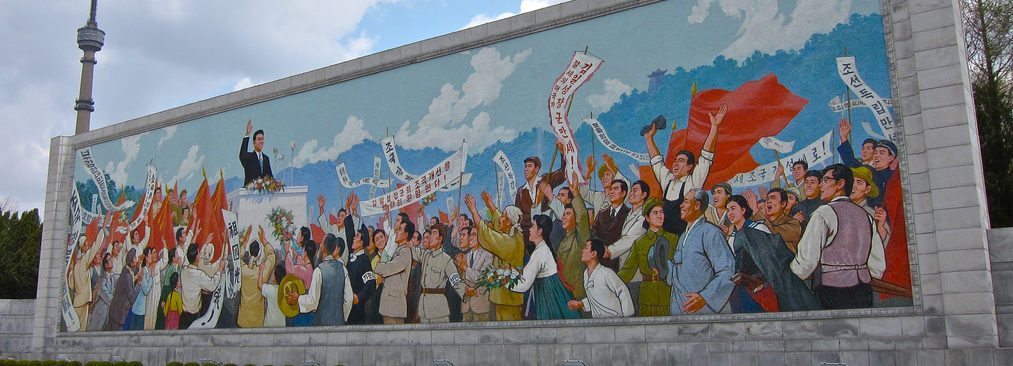Can the world afford nuclear war?
History does repeat itself.
Like in the 1950s with the Soviet Union, and like in the 1960s with China, the US is once again engaged in a heated face-off with a nuclear power.
If unleashed, the use of nuclear weapons between the two nations would result in an episode of devastating carnage…
Over the past few weeks, tensions have continued to skyrocket between US President Donald Trump and North Korean leader Kim Jong Un, with the rhetorical battle heating up day by day. If unleashed, the use of nuclear weapons between the two nations would result in an episode of devastating carnage, the likes of which the world hasn’t seen since World War II.
But whilst the biggest cost of war is always the loss of life and human suffering, staff at Capital Economics have also been thinking about the potential economic impact of a conflict between the two nations.
The Korean War of 1950-53 saw the value of South Korea’s GDP fall by over 80%…
Unsurprisingly and undeniably, war always deals out huge damage to a country’s GDP. In the post-Second World War era, the economies of countries where conflict had actually taken place suffered catastrophically.
In Syria today, the ongoing war has led to a 60% fall in the country’s GDP, and the Korean War of 1950-53 saw the value of South Korea’s GDP fall by over 80%.
The biggest loser
Should war breakout, it would be likely that US and South Korean forces engaged in conflict with North Korea on the Korean peninsula, suggesting that South Korea’s economy would be the worst hit.
South Korea is also the world’s […] second largest producer of semiconductors (17%)…
But the impact of such a conflict would likely spread to the wider global economy, as South Korea accounts for 2% of global GDP (the majority of the North’s trade takes place bilaterally with China, and so only the latter country would really be affected).
South Korea is also the world’s largest producer of liquid crystal displays (selling about 40% of the global total) and the second largest of semiconductors (17%), so the impact on global supply chains would be somewhat marked. Capital Economics compared it to the floods that hit Thailand in 2011 when the disruption from the flooding caused manufacturing industries to contract by 16%.
For South Korea however, the damage would be far worse. South Korea exports three times as many intermediate products as Thailand.
The US economy would also be hit by a conflict. The deployment of troops and resources to foreign shores, as well as the cost of maintaining them and conducting war efforts back home, all add up to monumental totals.
The total cost of the second Gulf War (which took place in 2003) and its aftermath has been estimated at $1 trillion…
At its peak in 1952, the US government was spending the equivalent of 4.2% of its GDP on fighting the Korean War. The total cost of the second Gulf War (which took place in 2003) and its aftermath has been estimated at $1 trillion. The Vietnam War cost the equivalent of more than $760 billion in today’s money.
It’s safe to say that war has not been, and never will be, a good idea from an economic perspective.
Can economics stop war?
Money has often been cited as a motivation for war, but perhaps Economics can also be used to prevent conflict.
Assuming it is down to North Korea to make the first move, from an economic perspective it is up to China to prevent them from doing so.
China still holds all the cards. Kim Jong Un’s regime is hugely dependent on its production and exports of coal, and suffered a hit in February when China said it would halt all coal imports…
China is North Korea’s major trade partner. If they were to start laying down the law, Kim Jong Un would have no option but to listen. This is clear after China’s backing of the UN Security Council’s sanctions earlier this month was met with an aggressive reaction from Pyongyang.
But China still holds all the cards. Kim Jong Un’s regime is hugely dependent on its production and exports of coal, and suffered a hit in February when China said it would halt all coal imports.
China could also sanction any banks doing business with Pyongyang, or prevent the country from sending workers into forced labour conditions in China in order to seize their wages.
China has the options, but it is eager to avoid the collapse of the North Korean regime. A collapse could see millions of North Korean refugees cross the border into China, and lead to a unification of the peninsula with Seoul as the capital.
Ideally, history will, once again, complete is repetition and a nuclear war will cease to come to fruition.
But should we not also learn from the past? The problem of North Korea is one that has troubled governments around the world for the best part of half a century. With this increased rhetoric however, it seems that substantial-enough action could be taken in order to finally deal with the rogue state once and for all.
In his latest comments, Trump has said that North Korea ‘will truly regret it’ if any US territory was attacked.
Indeed, we all will.

Comments